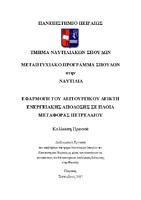Εφαρμογή του λειτουργικού δείκτη ενεργειακής απόδοσης σε πλοία μεταφοράς πετρελαίου

View/
Keywords
Κλιματική αλλαγή ; Προστασία του θαλάσσιου περιβάλλοντος ; Θαλάσσια ρύπανση ; Θεσμικό πλαίσιο ; Ενεργειακή αποδοτικότητα ; Εκπομπές αερίων ; Πλοία μεταφοράς πετρελαίου ; International Maritime OrganizationAbstract
The rapid climate change has led to the urgent need of implementing regulations so as to limit greenhouse gases emissions. The criticality and magnitude of the global maritime industry, the resulting gaseous emissions and the growing environmental burden have forced the IMO to develop a series of measures, including the Energy Efficiency Operational Indicator (EEOI).
This study calculates and analyzes the EEOI indicator and compares the results of different types of tanker vessels that emerged from a case study in a shipping company. More specifically, the calculation of the EEOI was performed in 42 tankers during the period 01/07/2016 -30/06/2017 by collecting information such as: the total quantity of transferred cargo, the total travelled distance and the type of consumed fuel per trip for each ship individually.
Results indicate that tanker vessels with greater capacity are more energy efficient compared to smaller ships. However, it was evident that variation in EEOI occurred between similar size vessels. The correlation between EEOI and vessel's DWT was calculated to be 40.65% (R2). Therefore, variations that have occurred are due to operational/logistic factors such as vessel's speed, weather conditions, hull cleaning and propeller maintenance, which in their own way each influences fuel consumption and should be taken into account in the index computation equation.


